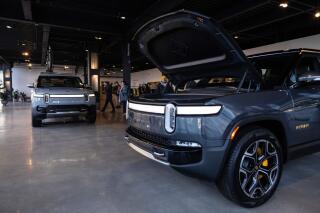Rivian, the Irvine-based electric vehicle manufacturer, is in talks with JPMorgan Chase & Co. to lead a potential $2 billion high-yield bond sale. The move is partly aimed at refinancing existing bonds maturing in 2026. According to sources familiar with the transaction, JPMorgan is gauging investor interest in the bond deal, with preliminary pricing discussions centered around a 10% yield. The transaction could be launched as early as next week.

The deal is still in the discussion phase and may not materialize as planned. A JPMorgan representative declined to comment, while Rivian did not immediately respond to requests for comment. This potential debt deal comes after Rivian announced that its full-year deliveries would decline more sharply than previously anticipated, partly due to concerns that President Trump’s trade war could dampen demand for electric vehicles. Rivian now expects to sell between 40,000 to 46,000 battery-powered vehicles this year, down from earlier projections.
Impact of Trade Policies
President Trump’s trade policies, including a proposed 25% levy on imported vehicles and ancillary parts, have led to revised earnings expectations across the automotive industry. Rivian CEO RJ Scaringe noted that tariffs could increase the company’s costs by several thousand dollars per vehicle. However, Rivian manufactures all its cars in the United States and sources most of its components from the U.S. or countries with a free-trade agreement spanning North America.

The U.S. junk-bond market has shown resilience, rallying for three consecutive sessions despite a spike in jobless claims. A recent dip in all-in yields has revived appetite for new deals after transactions came to a near halt in April. Rivian had previously raised about $1.25 billion in bonds in 2021.
Market Reaction
The news comes amid a backdrop of significant developments in the automotive and financial sectors. Shares of Rivian have been impacted by various factors, including the company’s production forecasts and the broader industry’s response to trade policies.

As the automotive industry continues to navigate the challenges posed by trade policies and market dynamics, companies like Rivian are adapting their strategies to mitigate risks and capitalize on opportunities in the evolving electric vehicle market.


